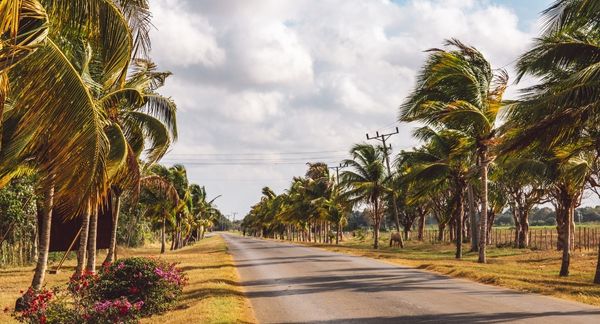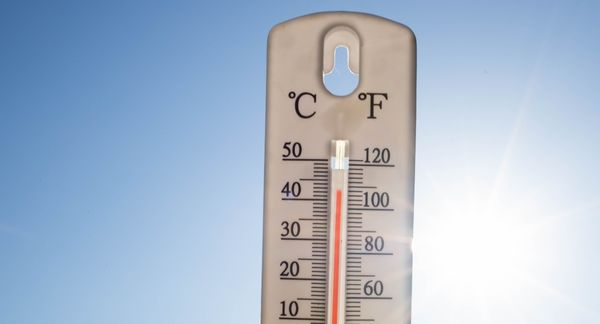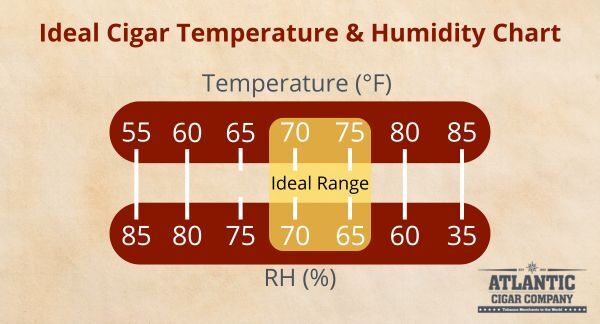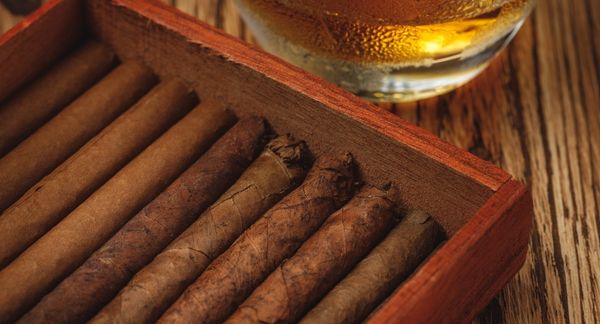After a long day, you finally sit down in your favorite chair.
You pour a glass of scotch and pull out that delicious cigar you have been looking forward to.
It's a beautiful feeling.
Then, the unthinkable happens. You discover that your cigar is stale!
So, what happened?
You probably take steps to keep your cigars fresh.
But sometimes, it just doesn't work out.
We've all been there before.
When it comes to ensuring a quality smoke, cigar humidity is critical.
Zino Davidoff, founder of the Davidoff Cigar brand, was one of the first to notice how different climates can impact the quality of tobacco. After returning to Europe from Cuba in the 1930s, Davidoff notices that the Cuban climate offers the best humidity for cigars.

As the word spreads, people begin searching for ways to mimic the Caribbean climate in other parts of the world. The humidor is born, and today, cigar connoisseurs have a variety of options for cigar storage that recreate a similar environment.
Before you search for the right solution to maintain favorable conditions for your cigars, you must understand a bit about cigar humidity and moisture content.
With this knowledge, you'll save some money and avoid the disappointment of discovering your cigar is bad.
In this article, you'll learn:
- An easy-to-understand overview of humidity
- How humidity affects cigars
- The ideal humidity for cigars to keep them delicious and fresh!
What is Relative Humidity?
Relative humidity (RH) measures the moisture content in the air. An easy way to think of it is the amount of water vapor, or moisture, relative to the temperature of the air.
Air expands and contracts.
Warm air expands. So, it can hold more moisture than cold air.
Cold air contracts.
No matter what, there's always a maximum amount of moisture the air can hold.
Relative humidity is the percentage of moisture in the air compared to the total amount of moisture that can exist at any time.
For example, an RH level of 65% indicates the air has 65% of the total moisture it can hold at that time.
How does temperature affect relative humidity?
Since RH is relative to the air temperature, temperature changes will alter the relative humidity.
When temperatures rise and air expands, the relative humidity of the air drops. There's more space to hold moisture in the expanded air. Therefore, unless you introduce more moisture as temperatures rise, conditions become drier, with lower relative humidity.
The same amount of water is present, but there's more space to hold it.
Conversely, when the temperatures drop, the air contracts, and the relative humidity rises. It's the same amount of moisture, but less space to hold water vapor in the air.
So, the moisture escapes from the air towards drier conditions. The same happens to your cigars when they aren't stored properly
What is the best temperature to store cigars?

Cigar Aficionado recommends maintaining a temperature of approximately 68-70 degrees Fahrenheit, but you should be fine between 65-75 degrees.
Maintaining a temperature range makes it easier to keep the humidity inside your storage container within the 65-70% range and the moisture content of your cigars between 12-15%.
How Does Humidity Affect Cigars?
The exact definition of relative humidity isn't important to memorize. However, how humidity affects cigars is.
Cigars are very sensitive to humidity. The fillers and wrapper absorb and release moisture from the surrounding air.
When you store your cigars, the air must have the correct humidity levels. The amount of moisture in the air impacts the moisture content of the cigar.
When humidity is too high, the moisture content of the cigars being stored will rise as they absorb water from the moist air.
When humidity is too low, the air will suck moisture from the tobacco leaves, lowering the cigar's moisture content.
What does the moisture content of a cigar measure?
Cigars are rolled with a moisture content of around 20%, which levels out between 12-15% by the time they are sold.
Moisture content is the percentage of water that makes up the total weight of the cigar. A moisture content within the ideal range of 12-15% means your cigar won't be too moist or dry.
One of the best devices to test your cigar's moisture is a HumidiMeter, which will give you an accurate reading of the RH. Cigars are best smoked between 56% - 68% RH when using a HumidiMeter.
If a cigar has a moisture content of 12%, 12% of its weight is in moisture (water weight), and the other 88% of the weight is from the wrapper and fillers.
When most people speak about cigar humidity levels, they are referring to the relative humidity of the air. Controlling the relative humidity of the air is how you control the moisture content of your cigars.
The gauge on your humidor measures the relative humidity of the air around your cigars.
Maintaining the relative humidity of the air where you store your cigars recreates the tropical Caribbean climate.
You will achieve a perfect balance between the relative humidity of your storage and the moisture content of your cigars.
Measuring the relative humidity of the air is easier than measuring the moisture content of your cigars.
What is the Best Humidity for Cigars?
The best relative humidity to store cigars is in a RH range between 65-70% for everyday smoking. If storing cigars for long periods of time or aging, serious collectors have been known to adjust these levels.
For everyday smokers, storing your cigars within the 65-70% range will help ensure your cigars stay fresh, full of flavor, and burn properly.
If you're a beginner, play it safe.
When your cigars are stored with relative humidity between 65% and 70%, the moisture content of your cigars will be ideal.
The aficionado with a more refined palate might have a preferred level that is right for their taste. Or even adjust the humidity level depending on what they store in their humidor and for how long.
The moisture content of cigars impacts the burn time, causing the cigar to burn at different temperatures.
The flavor profile of each cigar comes from oils in the tobacco.
Heating the oils and tobacco at different temperatures changes both the flavor and the aromas you experience.
What happens to cigars when relative humidity levels rise?
Higher humidity in the air means more moisture in your cigar. As the relative humidity of the air progresses through the range of 70-75%, and perhaps higher, the cigar will gradually absorb more water from the surrounding air. If there is too much moisture, the cigars become damp and can be challenging to draw from. This can also cause an uneven burn. Excessive humidity can even lead to mold formation.
What happens to cigars when relative humidity levels drop?
Lower humidity in the air means less moisture in your cigar. As the relative humidity decreases, your cigar loses moisture to the air. If there is insufficient moisture, the cigar will become very brittle and dry, resulting in a faster burn at a higher temperature.
Cigar Temperature and Humidity Chart

The above chart provides a helpful guide for determining the optimal temperature and humidity for your cigars.
What Are Common Issues with Cigar Humidity Levels?
Think about starting a campfire.
If you try to burn wood that is too wet, the fire won't light properly.
If you can get it going, it won't burn evenly and will keep going out.
If you try to burn wood that is too dry, the fire will burn too hot. It will be smoky and give off an unpleasant aroma.
But when you use the right wood, the fire burns beautifully.
It's the perfect temperature, gives off that pleasant campfire smell, and burns evenly.
The same goes for your cigars.
Maintaining ideal humidity is crucial if you want to avoid common issues with cigar humidity & storage. Issues with cigar humidity levels break down into two categories. Your cigars are either too dry or too moist. Both create problems such as loss of flavor, poor burn, harsh smoke, and mold.
What happens if cigar humidity levels are too dry?
If the relative humidity levels are too low, the conditions will be too dry.
The air will pull moisture from the cigar.
The tobacco leaves and wrapper will gradually become dry and brittle. This will eventually cause the wrapper to unravel.
Your cigar will lose essential oils, causing it to lose its flavor. The taste of each cigar is heavily influenced by the various oils within the tobacco leaves.
When your cigar is dry, it burns too quickly.
This raises the temperature of the tobacco leaves, further altering the flavor profile. The smoke will become bitter and harsh if your cigar burns too hot.
What happens if cigar humidity levels are too moist?
When a cigar is too moist, problems begin to occur.
With too much humidity, cigars become:
- difficult to light,
- burn poorly,
- lose their flavor,
- become swollen and soft, and
- can grow mold
Moisture is the key to a well-kept cigar. With the proper storage and humidity in the surrounding environment, cigars will last for years.
How do you address common issues with cigar humidity levels?

Creating the right cigar storage solution for your needs will help you avoid these common issues. Every smoke should be an enjoyable one. If you store cigars, invest in proper storage & control the climate.
If you begin to notice changes in how your cigars feel, burn, and taste, the problem is usually related to how you store them.
Ensure the hygrometer you use to measure the relative humidity is calibrated correctly.
The first step is to determine if your cigars are too moist or dry.
Once you know that, you can introduce more or less moisture into your storage environment to achieve the ideal conditions.
And if you’re smoking a cigar and notice it feels too dry or too damp, make a quick note of it in your cigar journal so you can track patterns and adjust your humidification before it becomes a bigger issue.
If you are having trouble figuring out any problems, most local cigar shops will be able to help you. And if you’re still exploring cigars while you dial in your storage setup, our list of cigars that work well for new smokers is a helpful place to start.
Climate impacts all living things.
As a naturally occurring plant, tobacco is susceptible to temperature and moisture before and after it is harvested. And all the way through consumption.
Now that you understand how cigar humidity levels matter and the optimal humidity to keep your cigars, you can create the perfect conditions to take advantage of deals on cigar packs, boxes, and samplers, knowing they will stay fresh.

